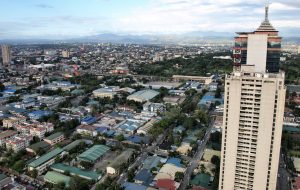Philippine President Rodrigo Duterte’s national police chiefs have not been known for their commitment to the promotion and upholding of human rights. His newest chief follows in the footsteps of his predecessors – but he is best known for violating his own lockdown rules.
Maj. Gen. Debold Sinas was named head of the Philippine National Police on November 9, after serving as Manila police chief since December 2019. He became notorious in May when he held a birthday party at police headquarters during a mandatory quarantine that he was tasked with enforcing. Attendees flouted social distancing rules and did not wear face masks as they shared a meal.
The party enraged Filipinos who had been stuck at home for weeks and subject to strict mask-wearing and social distancing rules – when they could even leave the house. In the six weeks before the party, the Philippines arrested more citizens for quarantine violations than any other country, most in the Manila area overseen by Sinas.
Senior police officials defended Sinas and claimed the event was not a “party” but a mañanita, in which the birthday celebrant is woken up in the morning with a serenade. Many Filipinos failed to see how the mañanita fell short of constituting “deliberate partying,” and Sinas and 18 other police officers were charged with social distancing violations.
But Duterte opted not to remove Sinas from his post, calling him “honest” and “a good officer.” Now, he has been promoted to oversee the country’s 200,000-strong police force.
Sinas is also under investigation for allegedly harassing a retired policeman living on the grounds of Camp Crame, the national police headquarters. CCTV footage showed Sinas and his men arriving at the man’s home and demanding that his family move out, even as they claimed to hold legal residency documents signed by Sinas himself.
During his Manila stint, the new police chief also made headlines for lashing out at numerous reporters and saying people should not protest during the pandemic as “it’s extra work for us.”
Perhaps the most damning blemish on his record comes from the time he spent in the Central Visayas region from 2018 to 2019. Sinas allegedly oversaw the targeted killings of farmers on Negros Island whom he claimed were members of the communist New People’s Army (NPA). Families of the deceased say the farmers were merely advocates for land rights, and no evidence has linked the farmers to illegal activities.
Sinas implemented a plan called “Oplan Sauron,” named after the “Lord of the Rings” villain. In its first phase, six farmers were killed by state security forces in December 2018. In its second phase, three months later, 14 farmers were killed on a single day throughout the island.
Sinas defended the operations, saying the farmers “really fought” and “were not ready to surrender, because they were hardcore rebels.” Numerous independent probes, including witness accounts, dispute that the deceased farmers fought back.
The Philippines’ controversial anti-terror law, enacted earlier this year at the height of the coronavirus pandemic, was likely inspired in part by the “state of emergency” declarations in Negros that gave Sinas the latitude to carry out the deadly operations. Now, he takes the reins of the entire nation’s police force.
Sinas will follow in the footsteps of past chiefs such as Ronald “Bato” dela Rosa, who served from July 2016 to April 2018 and oversaw tens of thousands of extrajudicial killings during President Duterte’s “war on drugs,” according to the country’s rights commission. Sinas has pledged to carry on with the drug war, which has become more deadly during the coronavirus pandemic.
Dela Rosa, now a senator, had his United States visa canceled in January due to his role in the extrajudicial killings. The decision set off a short-lived spat between Manila and Washington when Duterte canceled a defense agreement between the two, although he reversed that decision in June.
Under president-elect Joe Biden, the U.S. could take a firmer stance against Philippine rights violators. In September, a group of House Democrats introduced a bill that would suspend military aid to the Philippines if Manila does not show progress in improving its human rights record.
If Biden, as president, continues to show more interest in global human rights than his predecessor, Sinas may want to think twice before scheduling his next mañanita in Hawaii.

































